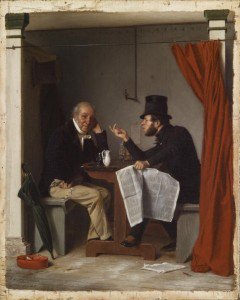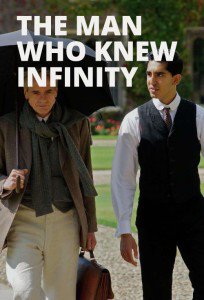
Derb’s February Diary: High Yellers (?); Politics/ Smartphone Fatigue; Irish Gangsters; etc.
03/01/2016
Quote of the Month. "The faintest of all human passions is the love of truth." — A.E. Housman.
Yellow journalism. In the February 19th podcast of Radio Derb, in reference to the Superbowl halftime show, I quoted a correspondent as telling me: "From the still pics, all of the dancers were 'high yella,' as is Beyoncé …" For my signout music that week I played a clip of Leadbelly singing Yellow Gal."
I told my correspondent I thought "high yaller" was the more correct form for persons of this tint; and I pronounced it that way in the podcast.
That got me into conversation with several listeners. Which is more correct, "high yella" or "high yaller"? I was sure I'd heard it as "high yaller."
Leadbelly isn’t much help: He plainly sings "yallo," which is neither the one thing nor the other.
My original correspondent came back with:
I checked. Yeller, yaller, yellah, yella, … You are right about the frequency of "yaller" on the Web, but "high yellah" and "high yella" appear to be much more frequent as user names. The former ("yellah") is the one I seem to recall from U.S. literature.Probably a regional difference to start with, and the Web enforces the second of the four variants.
According to a poster on Urban Dictionary, "yella" is the original form … I know UD is full of crap much of the time, but the writer of the entry is fairly convincing (and the example of usage at the end gave me a giggle).
"Yaller" and "yeller" appear to be northern forms.
Thanks, Ma'am. Slang City also seems to prefer "yeller."
Disney gave us Old Yeller, but that’s a different context, nothing to do with colored folk.
A friend who is au courant with the contemporary pop music world (I stopped listening to pop music back in the Ford administration) tells me that Beyoncé’s husband, Mr Jay-Z, refers to her in his 2009 song "Off That" as his "high yellow broad." Here are the lyrics, but I have no stomach to listen to an actual recording — you can only ask so much of a guy — so I don’t know whether Mr Jay-Z says "yella" or "yaller."
On balance here, I think I’m going to have to concede to the advocates of "yeller." The clincher is my recollection of that old 1920s pop song "Black Bottom," in which we hear about:
Old fellas with lumbagoWith high yellers, away they go …
You need that short "e" to sing it right.
(Seeking but failing to find a clip sung to the original lyrics, the nearest I got was Dorothy Provine ca. 1960; but Dorothy sings:
Old fellas with lumbagoAnd young fellas, away they go …
Political Correctness has been around longer than we think, I guess.)

Too much politics. Had enough politics yet?
I'll admit to suffering from politics fatigue. You can picture me as the old dude in R.C. Woodville’s oyster house. Eight more months of this? Good grief!
Let’s try to be constructive about it, though. Is there anything we can do to reduce the politicking?
One of my readers has a suggestion that I don’t recall seeing elsewhere, though I suppose in two and a quarter centuries someone else must have thought of it. My reader:
If I were an American, I would favor a constitutional amendment that would extend the term of office of Representatives to 4 years and of Senators to 8 years. That would eliminate mid-term elections and reduce the expense of elections, and thereby decrease the power of rich donors.
I would definitely sign on to that.

The devil makes work for idle thumbs. If there was ever any doubt that the smartphone was brought to us by Satan, this story from across the pond should settle the matter.
A British hairdresser was sentenced to life in prison last week after she plunged a knife into her boyfriend’s heart — because she felt he spent too much time on Facebook.Terri-Marie Palmer, 23, broke down in tears as she was convicted of 24-year-old Damon Searson’s murder …
Moments before the killing, Palmer posted: "He p***** me off sitting on Facebook, completely blanking me when I’m talking to him …"
She regularly posted on the social media site about how Searson would ignore her while scrolling through Facebook messages on his phone, adding random girls and posting shirtless photos of himself. [Woman killed boyfriend for spending too much time on Facebook by Sophia Rosenbaum; New York Post, February 22, 2016.]

I’m not surprised. To my way of thinking, nothing says "The 21st century sucks" like the sight of healthy young people walking around with their eyes locked on those fool gadgets, doing that thing with their thumbs. The latest trend is to move statuary out of public places so that the gadget-gazers won’t walk into them. [Sculpture moved after texters kept bumping into it by Luke Roney; USA Today, February 22nd 2016.]
I myself have of course resisted the Tempter. I have a flip-phone that I can make calls on, that’s all. The forces of darkness never prevail for long; sooner or later humanity will return to the path of righteousness and ditch its smartphones.
This may in fact be happening.
In January, British actor Eddie Redmayne made headlines around the world as he became the latest in a growing band of smartphone refuseniks."It was a reaction against being glued permanently to my iPhone during waking hours," he explained, turning instead to an old-fashioned "dumb phone" handset that could only make and take calls.
He is not alone. There is a small but busy market for phones that are simple and cheap at a time when smartphones are becoming ever more complex and expensive. [Digitally weary users switch to "dumb" phones by Daniel Thomas; Financial Times, February 22nd 2016.]
All strength to Mr Redmayne, whoever he is. Dump that phone, reader! … unless, of course, you're using it to access VDARE.com …
Middlebrow fiction find of the month. In my December diary I mentioned one of George MacDonald Fraser’s Flashman novels.
That prompted a reader to recommend John Biggins' Prohaska novels to me. My reader:
Like the Flashman series, they are the supposed reminiscences of an elderly man, but the hero (Otto Prohaska) is not a coward, bully or bounder, although he’s not exactly an innocent, either. The novels … are extremely well written and, best of all, are well-researched and provide some insight into the Austro-Hungarian Empire.

Always on the lookout for good middlebrow fiction, I gave the first Prohaska novel a try, and was hooked at once. At month’s end I am halfway through the fourth book, and I’m sorry there are only four.
Biggins knows an astounding amount about the Dual Monarchy in its later years: its bizarre salad of ethnicities, its arthritic bureaucracy, and its military equipment. He catches very nicely, too, its legendary atmosphere of ironic fatalism: "In Berlin the situation is serious but not hopeless; in Vienna things are hopeless, but not serious."
I have recommended the Biggins books to my friend and VDARE.com colleague Prof. Paul Gottfried, whose father was born in Budapest under the Dual Monarchy. Prof. Gottfried is the only person I know — possibly the only person extant — that describes himself as "a k.u.k. loyalist."
WARNING: Though not without human interest, these are guy books, with lots of Tom Clancy-style detail about WW1-era planes, ships, and submarines.
Also, like most books written in the unhappy period between publishers' abandonment of rigorous proof-reading in the 1970s and the rise of the computerized spell-check in the 1990s, they have a small number of mis-spellings of the more forgivable kind in both English ("miniscule") and German ("dienstauglich"). The author’s renderings of Polish, Czech, Serbo-Croat, Hungarian, and Italian, I'll take on faith.
The Sicily of the British Isles. Irish mobsters are in the news.
The press was barred from getting close to the flamboyant funeral Monday of David Byrne, 34, a reputed key underworld figure, according to multiple Irish media accounts. Byrne was gunned down in a brutal revenge killing at a boxing match weigh-in on Feb. 5, a murder followed by yet another retaliatory hit a few days later — both of which led to the threats to reporters.
For a British- or Irish-born reader, this is a comforting continuity piece, telling us that things are as they were and nothing much changes.
In my experience, Americans — including Irish-Americans — do not know that Ireland, with all its undoubted charms and accomplishments, is the Sicily of the British Isles.
Here is a personal anecdote.
In my college years I worked construction in the summer vacations. In the particular summer of 1965 I worked as a laborer on a site in the center of my home town: Northampton, in the East Midlands of England.
Northampton is a very old town. At some point in the Middle Ages several brick-lined tunnels were dug beneath the town center, I forget why. Our site was above one of these tunnels. A section of tunnel, accessible by steps, had been closed off at its ends with rubble for us to use as a break hut. At midday we would go down there to eat our lunch.
The other laborers were mostly Irishmen: sturdy peasant lads from the country towns and villages of Western Ireland. One was named Michael Shaughnessy, a lively and quick-witted young fellow who was as Irish-looking as it is possible to be.
Well, we were sitting there one day eating our lunch and making idle conversation when a stranger came down the steps into our cave. Sharply dressed and well-groomed even by provincial English street standards, he was strikingly out of place among us navvies in our work boots and dungarees, our hair caked with cement dust.
All conversation ceased. The stranger, who was plainly used to being in command of situations, let the silence hang for a few beats. Then, speaking softly in an Irish accent, he said: "I’m told there is a Michael Shaughnessy here."
Michael spoke up: "I’m Michael Shaughnessy."
The stranger fixed his gaze on Michael, and dragged out another little silence. As unworldly as I was at age twenty, at this point I realized that something was going on.
The stranger spoke again: "Michael Shaughnessy from Dundrum?" (That’s a suburb of Dublin. There are also towns of this name elsewhere in Ireland; but referred to with no qualifier like this, outside Ireland, you'd assume the Dublin suburb is what’s meant.)
"No," said Michael. "I’m from Connemara." (Which was true. The Irishmen all knew where each other came from, and mentioned it often. The Connemara lads were in fact something of an elect among the laborers.)
Another short silence. Hear a pin drop? You could have heard a neutrino pass through.
"Ye'll excuse me, then," said the stranger. He turned and left. We never saw him again.
There was much discussion afterwards. The sense of the meeting was that wherever Michael Shaughnessy of Dundrum might be, if our visitor should find him, he'd be in a world of hurt.

Getting right with McWhorter. In the January 29th Radio Derb I declared my intention to mend bridges with with linguist (in the academic, not the colloquial sense: not a guy who speaks lots of languages, but a guy who studies language) John McWhorter:
I really have to get right with McWhorter. He’s addressing one of my dinner clubs in March, so I'll be chowing down on rubber chicken across the table from him. A couple of years ago I reviewed one of his books in a way that displeased him somehow; a mutual acquaintance told me he was grumbling about it. I forget the grounds of his complaint, but I'll try to get right with him.
I don’t know how the bridge-mending will go; but possibly influenced in part by that intention, my February purchase from the Great Courses Company was McWhorter’s 36 lectures on "The Story of Human Language."
Good interesting stuff, and nothing like as demanding as my previous selection, Prof. Joordens' lectures on memory. Just the thing to listen to while walking the dog, in fact.
McWhorter has a pleasant, easy manner, too. This passage from Lecture 7, "How Language Changes — Modern English," returned an echo from my bosom, and I imagine would have the same effect on a great many educated people:
I will openly admit that except when I have read a Shakespeare play … when I go and hear it "cold," at normal speed, I don’t understand enough to make the evening worth it. I don’t like to admit it: I learned long ago that you're not supposed to say so: but it’s true. And even as somebody who loves languages and is pretty familiar with English and all of its historical layers, I have seen The Tempest not once, not twice, but three times, never having gotten down to reading that particular play, I have never known what in the world was going on in that play. And I seriously doubt if I’m alone.
I’m sure he’s not alone. If the good Prof has that much trouble with The Tempest, though, I advise him to give a wide berth to Cymbeline:
To remark the folly of the fiction, the absurdity of the conduct, the confusion of the names and manners of different times, and the impossibility of the events in any system of life, were to waste criticism on unresisting imbecillity, upon faults too evident for detection, and too gross for aggravation. [Samuel Johnson, Notes to Shakespeare (1765).]
Je suis circonflexe. One more on the language beat: The French are killing off the circumflex.
The circumflex (French "circonflexe") is the little pointed "hat" you see over vowels like the "e" in "tête." Well, the French have decided it’s a nuisance. As of this September, it'll be optional in school textbooks.
As a conservative, I suppose I should deplore this. Conservatives in France certainly do: they have started up a Twitter hashtag "#JeSuisCirconflexe."
Frankly, though, I have to say, tout ça m'est bien égal. The distance between French spelling and French pronunciation is already so wide, I can’t see that it makes any difference. Say what you like about the Germans, but at least they pronounce every single damn consonant.
And ever fewer of us are willing to learn French anyway.
It’s probably not an exaggeration to say that the study of French is dying in the English-speaking world; and who can blame pupils for dropping what is a difficult subject? I certainly would have. I hated French at school, mainly because I was no good at it, and only in my late 20s fell in love with all things Gallic, and started taking evening classes.By then, of course, it was an uphill struggle: life gets busier, and the brain finds it harder to absorb new ideas — which is why, one-by-one, our musical tastes, political views and haircuts get stuck at whatever age we gave up on trying new things. (I’m not quitting: after all, Alfred the Great learned Latin in his 40s, and he had the Vikings to contend with.) My reading has improved but my spoken French is still reminiscent of the undercover British agent in 'Allo 'Allo.
It’s oddly paradoxical that this decline … happened at the same time that a new generation of progressive Britons embraced cosmopolitanism and cultural diversity. It often seems that this enthusiasm was more in the abstract. One can be keen on having lots of foreign restaurants nearby yet still be strangely incurious about other cultures. [The long adieu: how Britain gave up learning French by Ed West; Daily Telegraph, January 22nd 2016.]
Back to work. St Valentine’s Day (no, not just a Hallmark Holiday: it’s in Chaucer and Shakespeare), in my mental map of the year, usually marks the end of the Long Holiday Season:
- Halloween
- Thanksgiving
- Christmas
- New Year
- Chinese New Year
- St Valentine’s Day
I say "usually" because Chinese New Year falls later than St Valentine’s Day about one year in five. Whatever: For three and a half months there is candy to be put out, family gatherings to supervise, trees to put up, cards to be sent, gifts to be gifted, special meals to be prepared, friends to entertain or be entertained by … Then, nothing much in that line until a barbecue on the Fourth.
This is a complete change from one’s school and college years, when the long summer vacation was the relaxation zone, and September the back-in-harness month. When was the transition? When we had kids, of course. Kids change everything.
OK, back on the treadmill. Give me a hand up there, would ya?
Math Corner. February 28th brought us the Oscars. Having zero interest in showbiz, and irritated near to suicide by the event being made yet another outlet for whining about "white privilege," I didn’t watch them. They did remind me, though, that there’s a movie I’m keen to see.

This is the film version of Robert Kanigel’s 1991 book about Srinivasa Ramanujan. The first I heard of it was an article in the February Notices of the AMS.
(If you don’t know the Ramanujan story, it is adequately told at the University of St Andrews math biography site. In briefest outline: A poor man from an obscure provincial town in the far south of India, at age 15 Ramanujan chanced upon a handbook of mathematical results. Working up from that, and mostly alone, Ramanujan recreated quite large parts of 18th- and 19th-century math. Cambridge mathematician G.H. Hardy brought him to England in 1914. Ramanujan did some brilliant work; but he suffered from TB and died in 1920 at age 32.)
The movie has the same name as the book: The Man Who Knew Infinity. Jeremy Irons plays the role of G.H. Hardy; Jeremy Northam is Bertrand Russell.
Robert Kanigel’s book is excellent, that silly title notwithstanding. (Ramanujan "knew infinity" neither better nor worse than any other mathematician working in analytical number theory. This may not be the author’s fault, though; titles are sometimes imposed by publishers.)

Here is the final paragraph of Kanigel’s main narrative.
In South India today, everyone has heard of Ramanujan. College professors and bicycle rickshaw drivers alike know his story, at least in sketchy outline, just as everyone in the West knows of Einstein. Few can say much about his work, and yet something in the story of his struggle for the chance to pursue his work on his own terms compels the imagination, leaving Ramanujan a symbol for genius, for the obstacles it faces, for the burdens it bears, for the pleasure it takes in its own existence.
The Notices say this new movie was shown at the Toronto International Film Festival last September; but Netflix lists it for 2016 release and not yet on DVD.
Something to look out for if you're a math geek — or just if you like an improbable true story with a high pathos quotient.
To the degree Ramanujan is known at all outside the world of math, it’s for the taxicab incident. MathWorld tells the story.
John Derbyshire writes an incredible amount on all sorts of subjects for all kinds of outlets. (This no longer includes National Review, whose editors had some kind of tantrum and fired him. ) He is the author of We Are Doomed: Reclaiming Conservative Pessimism and several other books. He’s had two books published by VDARE.com: FROM THE DISSIDENT RIGHT (also available in Kindle) and From the Dissident Right II: Essays 2013. His writings are archived at JohnDerbyshire.com.
Readers who wish to donate (tax deductible) funds specifically earmarked for John Derbyshire’s writings at VDARE.com can do so here.

